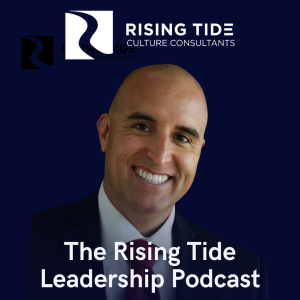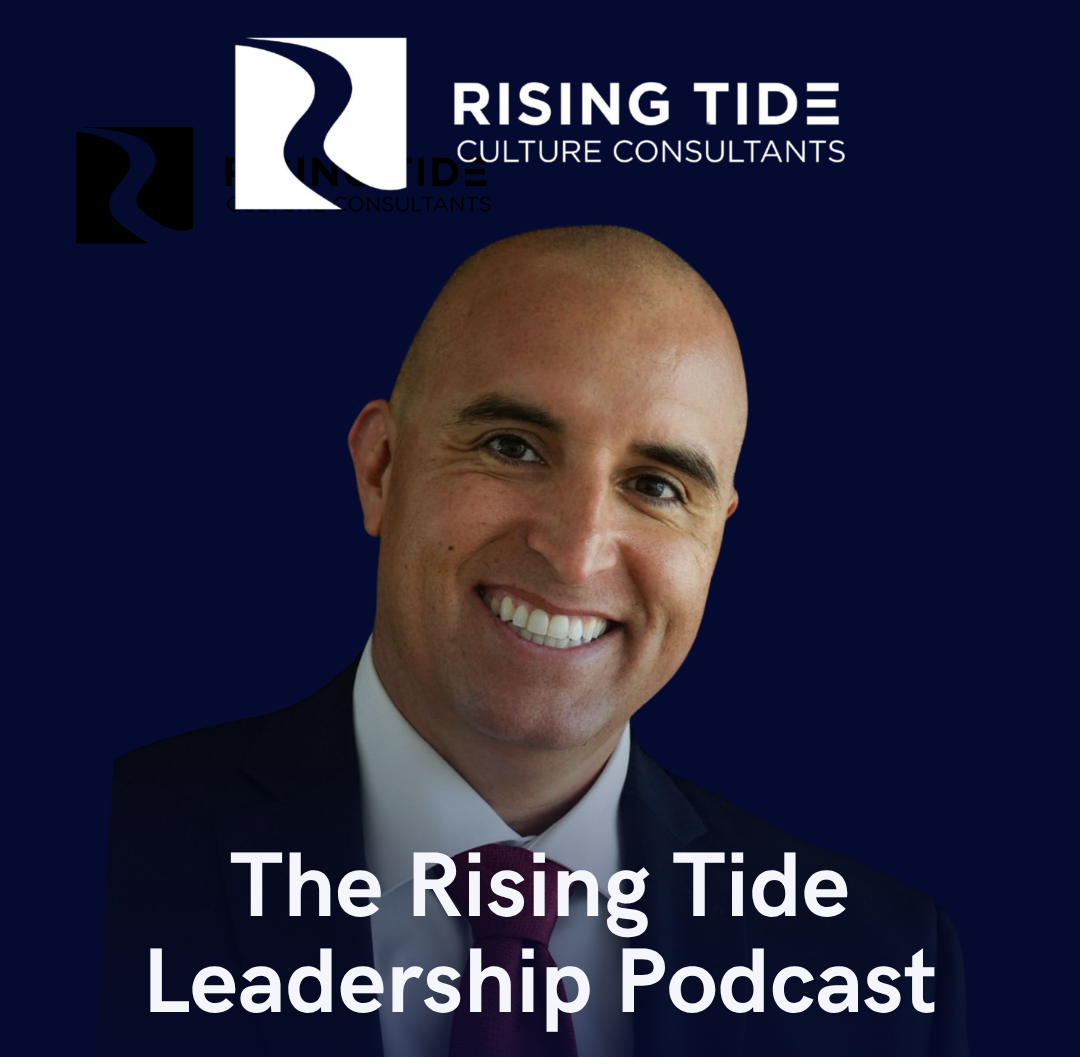Episodes

21 hours ago
21 hours ago
🎙️ What if your greatest leadership tool isn’t a speech... but a book?
📚 In this episode, international bestselling author Everett O’Keefe joins MO to unpack how writing a book can elevate your influence, unlock new opportunities, and leave a lasting legacy. From mindset blocks to marketing hacks, this is your all-access pass to becoming the author(ity) you were meant to be.
✍🏽 So… what’s stopping YOU from writing your first book? 🤔
#LeadershipDevelopment #WriteYourBook #AuthorInfluence #IgnitePress #ThoughtLeadership #PersonalBranding #LegacyLeadership #BusinessPublishing #EverettOKeefe #RisingTidePodcast

Monday Jun 23, 2025
How Great Leaders Build Systems That Actually Work | Mark Reich (Ep. 108)
Monday Jun 23, 2025
Monday Jun 23, 2025
What do Toyota, strategy, and real leadership have in common? Mark Reich—former Toyota exec and Lean Enterprise Institute strategist—joins us to drop 🔥 on how leaders can stop managing chaos and start leading with purpose. We’re talking systems, people, trust, and the art of daily improvement. Ready to rethink how you lead your team?
💡 What’s really driving your leadership—purpose or pressure? 🤔
#LeadershipPodcast #MarkReich #LeanThinking #ToyotaLeadership #DailyManagement #HoshinKanri #ManagingOnPurpose #PurposeDrivenLeadership #TeamCulture #RisingTideLeadership
www.linkedin.com/in/markareich
Managing On Purpose: https://shorturl.at/i0y6G
https://www.lean.org/about-lei/senior-advisors-staff/mark-reich/

Monday Jun 16, 2025
Monday Jun 16, 2025
What does it take to grow a $2 billion business and keep your team happy? 💼💰 CEO Collin Plume breaks down how health, heart, and hiring right fueled Noble Gold’s massive success. From ditching debt to ditching micromanagement, this episode is full of gold (literally). ✨ Can you really build profit and prioritize people at the same time? Let’s find out. 💬👇
#LeadershipMatters #CollinPlume #BusinessGrowth #PeopleOverProfit #CEOInsights #EntrepreneurLife #CompanyCulture #GoldIRA #WealthBuilding #RisingTideLeadership
youtube.com/@NobleGold/featured
mydigitalmoney.com
guardianhr.com

Monday Jun 09, 2025
Unlocking Workplace Trust Across Generations | Dr. Meghan Grace (Ep. 106)
Monday Jun 09, 2025
Monday Jun 09, 2025
Are you ready to decode the chaos of leading across generations?
👥 In this energizing episode, Dr. Meghan Grace joins us to reveal what Gen Z really wants, why Millennials love structure, and how Baby Boomers built trust before email. 💼🔥
Learn how to lead smarter, not harder, in today's multi-gen workplace. Are you adapting fast enough — or getting left behind? 👀
#LeadershipTips #GenZWorkforce #MultiGenerationalTeams #FutureOfWork #MeghanGrace #WorkplaceCulture #LeadershipDevelopment #EmotionalIntelligence #MillennialsAtWork #RisingTideLeadership

Monday Jun 02, 2025
Stop Leading Alone: Build a Culture of Shared Leadership (Ep. 105)
Monday Jun 02, 2025
Monday Jun 02, 2025
What do King Arthur, SEAL Team 6, and IDEO all have in common? They knew how to build a culture of trust, respect, and collaboration. In this episode, Mo and Scott break down what it takes to turn your team into a powerhouse of shared purpose and innovation. From hilarious Monty Python tangents to hard-hitting leadership truths—this one has it all. Is your leadership building culture or just keeping control?
#LeadershipPodcast #CollaborativeCulture #TeamworkMatters #ModernLeadership #CultureCode #TrustInTeams #RespectInLeadership #ExtremeOwnership #SEALTeamLeadership #RisingTideLeadership

Monday May 26, 2025
Executive Coach Reagan Cannon’s Guide to SCALED Leadership (Ep. 104)
Monday May 26, 2025
Monday May 26, 2025
Ready to scale your leadership without losing your mind? 🚀 In this episode, Reagan Cannon—global exec, TEDx speaker, and leadership coach—shares the SCALED method to grow your influence, lead with confidence, and communicate like a pro. Whether you're leading a startup or a global team, this episode is packed with 🔥 insights you can use today.
💡Which leadership trait do YOU need to level up most?
#leadershipdevelopmentprogram #ExecutiveCoaching #ScaleYourLeadership #ReaganCannon #RisingTideLeadership #LeadershipTips #BusinessLeadership #WomenInLeadership #LeadershipPodcast #communicationskillstraining www.reagancannon.com

Monday Apr 28, 2025
The Future of Leadership in a Tech-Driven World w/Peter Vasilion (Ep. 103)
Monday Apr 28, 2025
Monday Apr 28, 2025
What happens when leadership meets cutting-edge tech? 🚀 Join us as Peter Vasilion, CEO of Facet Interactive and COO of FlightFX, shares how aligning IT with strategy can unlock insane growth 💻✨. We dive into simplifying complex processes, leading remote teams, and why digital transformation always starts with people. 🌎👊 Ready to rethink how you lead in a tech-driven world?
Question:
How are you preparing your team for the future of leadership? 🔥
#LeadershipDevelopment #TechLeadership #DigitalTransformation #BusinessGrowth #InnovationCulture #RemoteLeadership #LeadershipPodcast #RisingTideLeadership #FutureOfWork #StrategicLeadership
https://www.linkedin.com/in/pvasilion/
https://www.linkedin.com/company/flightfx/
https://facetinteractive.com/
https://www.flightfx.io/
peter@facetinteractive.com

Monday Apr 21, 2025
Monday Apr 21, 2025
What if your worst day as a leader didn’t have to wreck your reputation? 💥 In this episode, crisis expert Stephanie Craig from Kith shares how the best leaders prepare before disaster strikes. From reputational risks to HR nightmares to "smoke vs. fire" moments, we dive into how to lead with calm, clarity, and confidence. 🧠🔥
👉 Are YOU ready to lead through crisis… or just hoping you won’t have to?
#LeadershipPodcast #CrisisLeadership #StephanieCraig #ReputationMatters #CrisisManagement #BusinessLeadership #LeadWithClarity #ExecutiveMindset #LeadershipTips #risingtideleadership
https://kith.co/rising-tide-leadership/

Monday Apr 14, 2025
Barbara Boselli on Emotional Intelligence (Ep. 101)
Monday Apr 14, 2025
Monday Apr 14, 2025
What do mindfulness, Google, and emotional intelligence have in common? 👀 In this episode, executive coach and founder of BNow Consulting, Barbara Boselli, reveals how authentic leadership can transform not only your workplace—but your life. 🌱 From self-awareness to journaling hacks, this convo is packed with practical leadership gold.
✨ Are you ready to lead from the inside out?
🧠💥 #LeadershipDevelopment #EmotionalIntelligence #AuthenticLeadership #MindfulLeadership #SelfAwareness #ExecutiveCoaching #LeadershipPodcast #BNowConsulting #WomenInLeadership #personalgrowth
🌐 Website https://www.bnowconsulting.com
💼 LinkedIn https://www.linkedin.com/in/bgeluda/
📺 YouTube @bnowconsulting
📸 Instagram https://www.instagram.com/bnow.consulting/

Monday Apr 07, 2025
Why Your Team Doesn’t Trust You... And How to Fix It (Ep. 100)
Monday Apr 07, 2025
Monday Apr 07, 2025
In this episode of the Rising Tide Leadership Podcast, MO and Scott dive into the real backbone of leadership: decision-making and integrity. 💥 From Patagonia's bold Black Friday campaign to Churchill’s wartime resolve, discover how great leaders make tough calls and stand by their values—even when no one’s watching. 👀
So… are you leading with integrity or just hoping for the best? 🤔
#Leadership #IntegrityMatters #DecisionMaking #LeadWithPurpose #ValuesBasedLeadership #TrustInLeadership #BusinessEthics #LeadershipDevelopment #RisingTidePodcast #MakeAnImpact

